How does transport impact health in Malta?
Insights and questions from panel discussion 1 of the ‘Safe and Healthy with Sustainable Mobility in Malta’ online seminar.
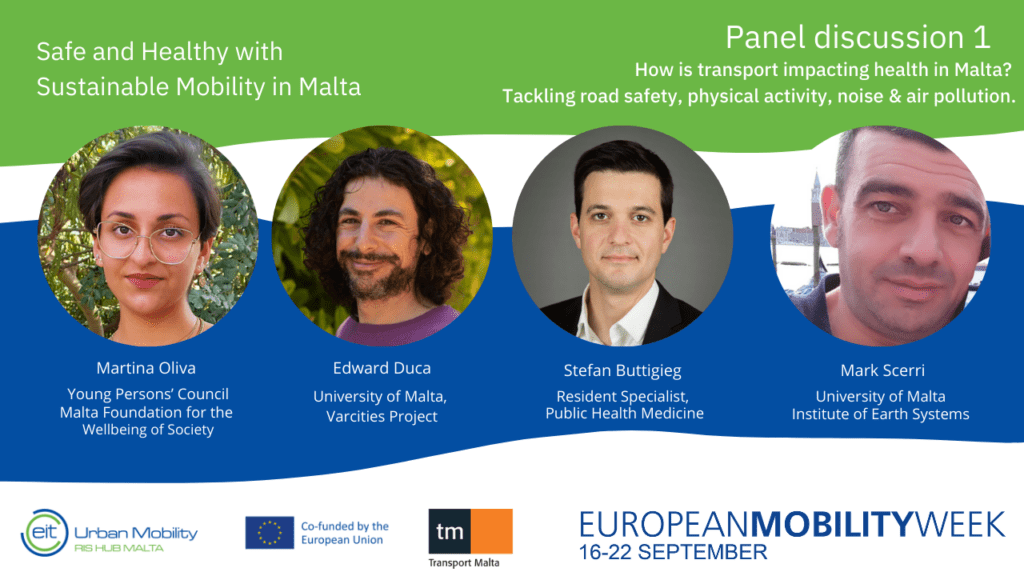
CONTEXT: On Thursday 16 September, the EIT Urban Mobility Hub Malta, in collaboration with Transport Malta, organised the online seminar ‘Safe and Healthy with Sustainable Mobility in Malta’. In line with this year’s theme for the EUROPEANMOBILITYWEEK 2021, the seminar included three live panel discussions to raise awareness on challenges around mobility and health locally, while providing practical take-aways and information to the audience.
Following an introduction by Dr. Suzanne Maas, opening the event on behalf of the EIT Urban Mobility Hub Malta, Mr. Juan Caballero of Eurocities presented an overview of the 20-year history of EUROPEANMOBILITYWEEK, the European Commission’s flagship awareness-raising initiative on sustainable urban mobility. He explained how this year’s campaign focused on health, following the Covid pandemic, including both physical and mental health. To celebrate their 20 year anniversary, EUROPEANMOBILITYWEEK opened a Virtual Museum, showcasing how residents have adapted their mobility habits in favour of active mobility, public transport, and other clean, intelligent transport solutions, through inspiring stories and images from cities across Europe.
Moderated by Ms. Antonella Axisa, the first panel kicked off the discussion by addressing how transport impacts health in Malta, in terms of road safety, physical activity, noise and air pollution. Invited speakers on the panel were Ms. Martina Oliva, a 17-year old student and member of the Young Persons’ Council within the Malta Foundation for the Wellbeing of Society, Dr. Edward Duca from the University of Malta, representing the Varcities project, Stefan Buttigieg, M.D., resident specialist in public health, and Dr. Mark Scerri, air quality resident academic at the University of Malta.
As there was a doctor in the room, the audience was immediately reminded of the severity of the issue. As a public health specialist, Stefan Buttigieg, M.D., shared the concerning fact that in Malta over 500 people per year die prematurely due to the effects of air pollution.
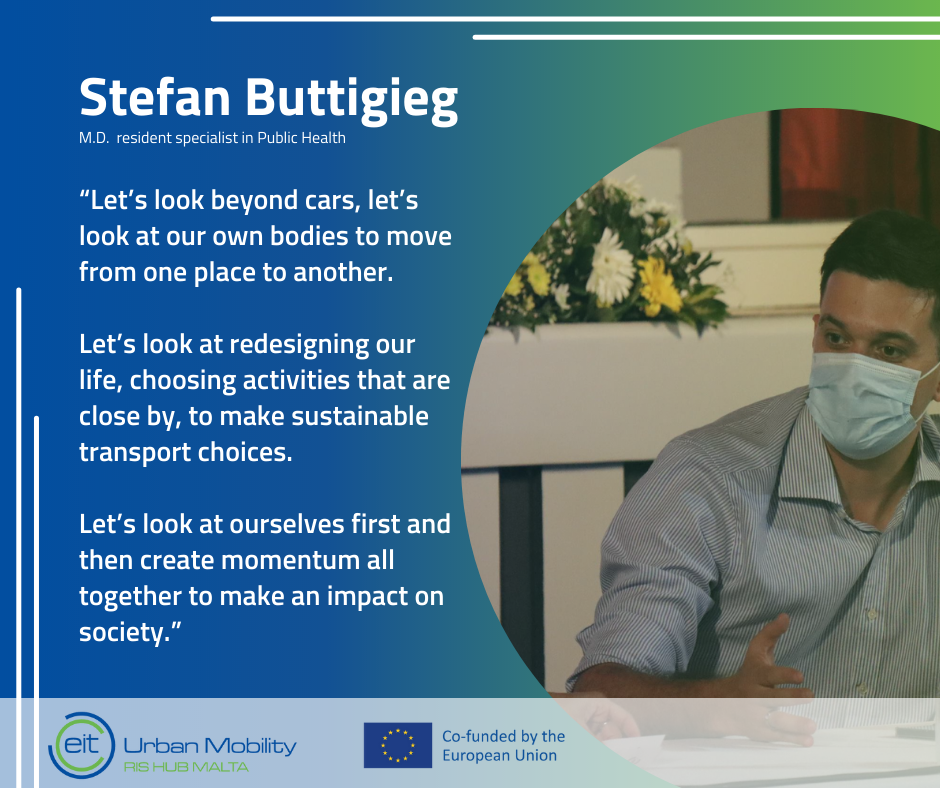 To address the impacts of transport on health, he put forward the idea of a ‘one health’ approach, considering human health, environmental and animal health all together. He advocated for putting active mobility as priority number one, to safeguard and improve public health, both in terms of physical health and mental wellbeing. He explained that if we would design our lives around active commutes, walking or cycling to and from work or school every day, the cumulative impact on our health, of being active on a daily basis, would be very positive. He added however, that for this to happen, we would need the infrastructure to make that change.
To address the impacts of transport on health, he put forward the idea of a ‘one health’ approach, considering human health, environmental and animal health all together. He advocated for putting active mobility as priority number one, to safeguard and improve public health, both in terms of physical health and mental wellbeing. He explained that if we would design our lives around active commutes, walking or cycling to and from work or school every day, the cumulative impact on our health, of being active on a daily basis, would be very positive. He added however, that for this to happen, we would need the infrastructure to make that change.
Ms. Martina Oliva shared that as a young person, she finds it extremely important to consider how comfortable and safe children are feeling in terms of their transport and mobility. She commented how walking, the oldest and simplest form of transport, has become unnecessarily complicated, due to the shortcomings of the infrastructure, chipped off pavements and barriers in the way. This is not only the case for children and youths, but for anyone who walks, including people with impaired mobility, elderly persons or parents with a pushchair. She commented that there is a clear connection between transport, pollution and climate change, as land transport is one of the main sources of carbon emissions in Malta, and that there is a need for immediate action to address this.
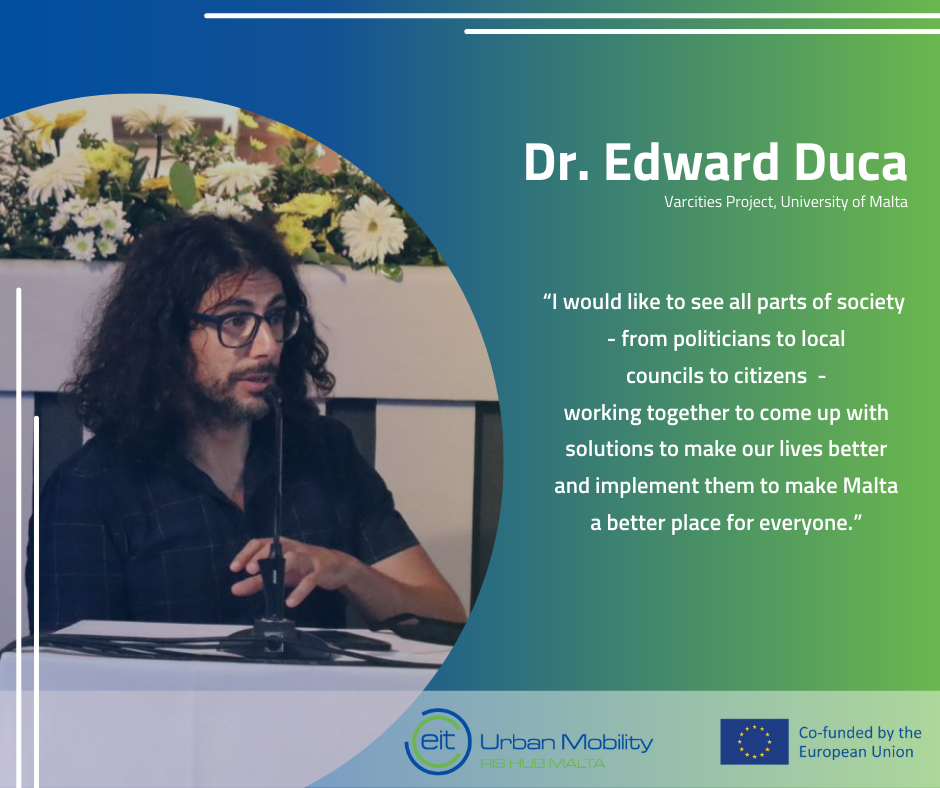 Commenting on the pilot site for the Varcities project in Gżira, Dr. Edward Duca explained that the street sees a high level of air pollution due to traffic and very limited greenery. This also contributes to what is called the Urban Heat Island effect, a higher ambient temperature due to a high level of human activity and covered surfaces. Surveys with local residents show clearly that people want more green and open spaces, to have space for physical activity and to contribute to better mental wellbeing.
Commenting on the pilot site for the Varcities project in Gżira, Dr. Edward Duca explained that the street sees a high level of air pollution due to traffic and very limited greenery. This also contributes to what is called the Urban Heat Island effect, a higher ambient temperature due to a high level of human activity and covered surfaces. Surveys with local residents show clearly that people want more green and open spaces, to have space for physical activity and to contribute to better mental wellbeing.
Investing in nationwide walking and cycling infrastructure can contribute to reaping physical and mental health benefits. Dr Mark Scerri added that this would need to be complemented by other policy changes, such as the introduction of dedicated bus lanes and a Bus Rapid Transit system, or even light rail on the longer term, but also disincentives for the private car, for example through congestion charging. He further commented that while a shift from internal combustion engine (ICE) to electric vehicles (EV) is being put forward by the government as one of the main investments in sustainable mobility in Malta, they do not present a solution to all transport related issues. While they can solve problems related to carbon emissions (depending on the source of the energy used to generate the electricity), particulate matter emissions of EVs are on par with those from ICE vehicles, primarily because of their heavier weight leading to increased generation of particulate matter from abrasion of tyres and road surfaces. He concluded that we need more than one measure to shift towards a sustainable mobility system; not just electric vehicles.
Transport does not have an impact only on physical health, but also on mental health and wellbeing, in terms of feelings of stress and fear, as well as the opportunities (or lack thereof) of social contact. The current transport system is felt as stressful by the panelists, for all types of travellers: be it on foot, on the bus, or by car. Martina shared her dream of a future in which people can feel safe when they leave their home, living in a society where people are aware of each other’s needs, where roads and public spaces are safer, more pleasant and more serene.
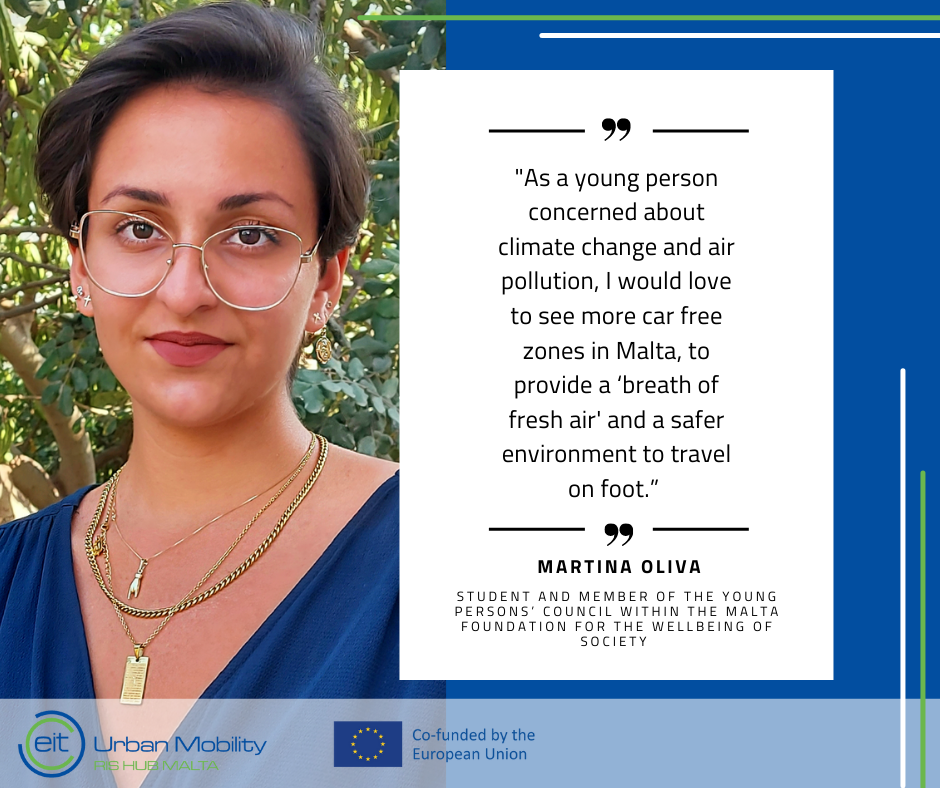
As the seminar was broadcast live online, the audience could pose their questions to the panelists. A member of the audience asked the panelists if they could, thinking of their current place of work or education, actually travel there by active or public transport. What could change people’s attitudes and travel needs, and what would they need to make their journey more easy, comfortable and timely? Comments ranged from a plea for an extended network of smaller, on-demand buses, to safer and more green infrastructure to make active travel a safer and more comfortable option.
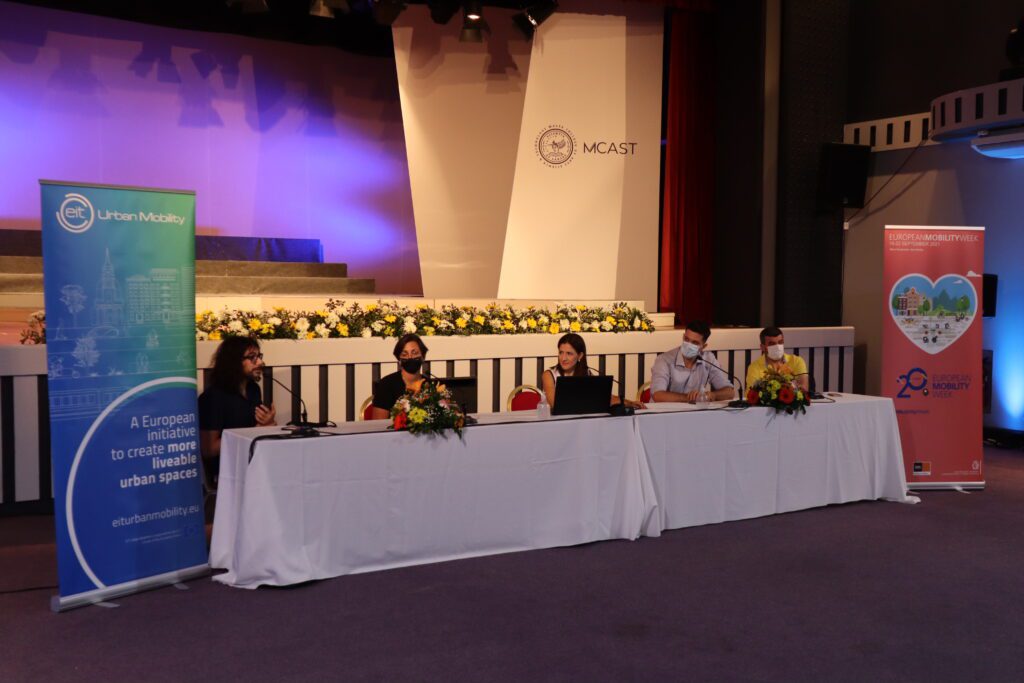
Engaging conversations during the first panel discussion on the topic of mobility and health, with from left to right: Dr. Edward Duca, Ms. Martina Oliva, the moderator Ms. Antonella Axisa, Mr. Stefan Buttigieg, M.D, and Dr. Mark Scerri.
To conclude this session, public health specialist Stefan Buttigieg put forward the following final remark: “Let’s look beyond cars, let’s look at our own bodies to move from one place to another. Let’s look at redesigning our life, choosing activities that are close by, to make sustainable transport choices. Let’s look at ourselves first and then create momentum all together to make an impact on society”.
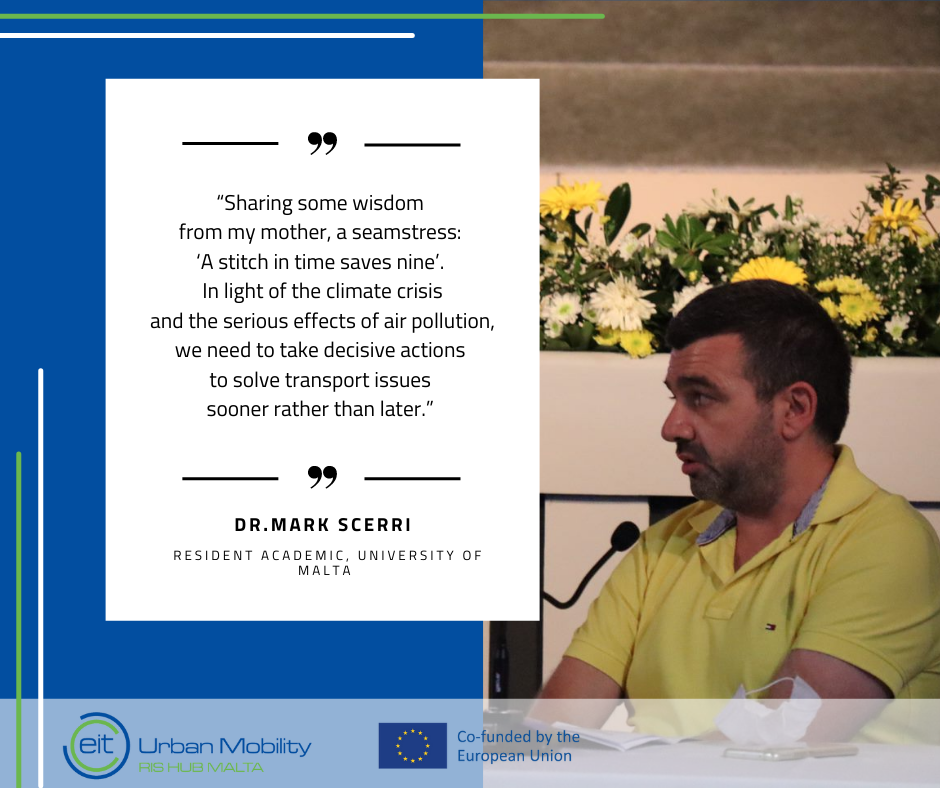 Dr. Mark Scerri shared some wisdom from his mother, a seamstress, that “a stitch in time saves nine”: in light of the climate crisis and the serious effects of air pollution, we need to take decisive actions to solve transport issues sooner rather than later. Student Martina Oliva appealed to car drivers to act more responsibly, not to park illegally for their own convenience, blocking ramps or crossings and leaving their engine running. She would also like to see more car free zones in Malta, to provide a “breath of fresh air” and a safer environment to travel on foot. Dr. Edward Duca concluded that he would like to see all parts of society – from politicians to local councils to citizens – working together to come up with solutions to make our lives better, and implement them to make Malta a better place for everyone.
Dr. Mark Scerri shared some wisdom from his mother, a seamstress, that “a stitch in time saves nine”: in light of the climate crisis and the serious effects of air pollution, we need to take decisive actions to solve transport issues sooner rather than later. Student Martina Oliva appealed to car drivers to act more responsibly, not to park illegally for their own convenience, blocking ramps or crossings and leaving their engine running. She would also like to see more car free zones in Malta, to provide a “breath of fresh air” and a safer environment to travel on foot. Dr. Edward Duca concluded that he would like to see all parts of society – from politicians to local councils to citizens – working together to come up with solutions to make our lives better, and implement them to make Malta a better place for everyone.
Words by Dr. Suzanne Maas, Applied Research and Innovation Centre at MCAST, partner of the EIT Urban Mobility Hub Malta.
Photo by Noel Muscat, MCAST CSR & Events Department.